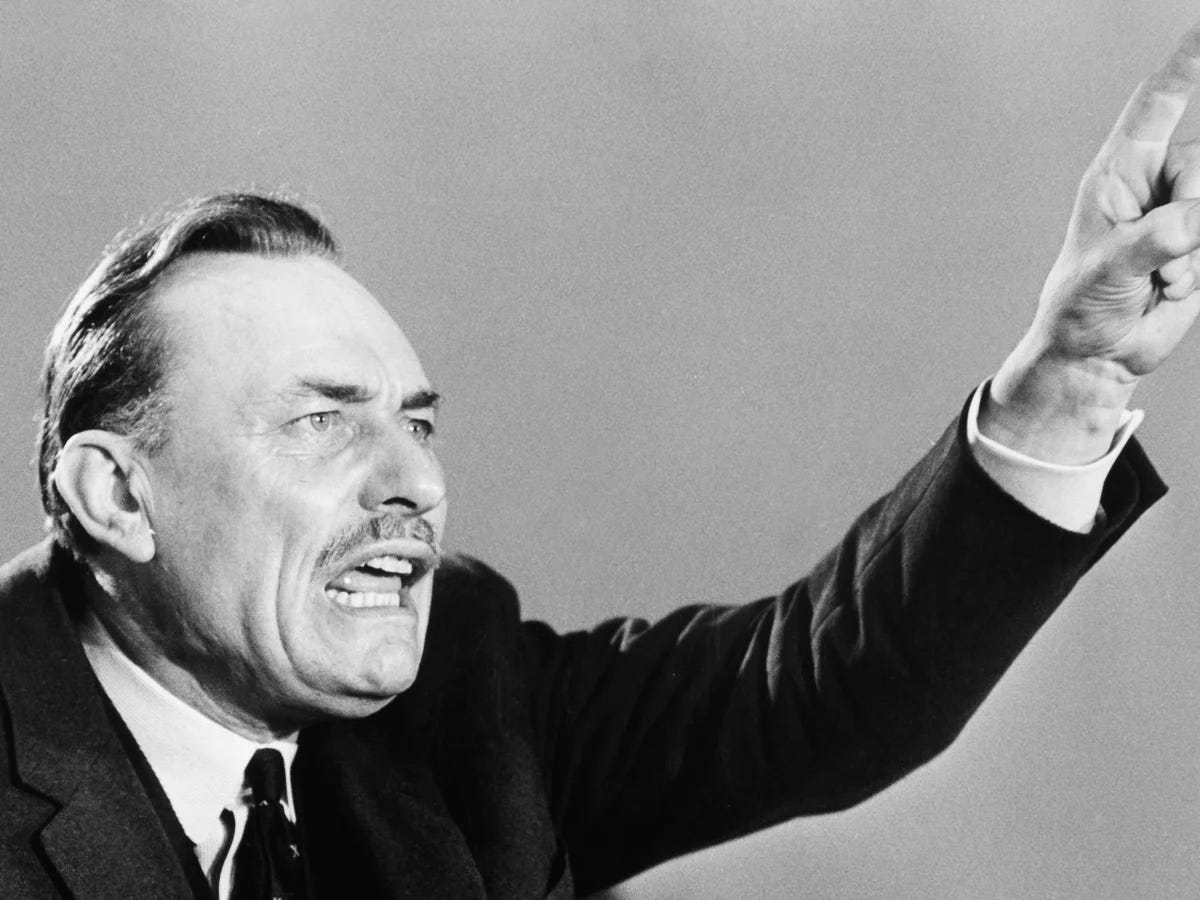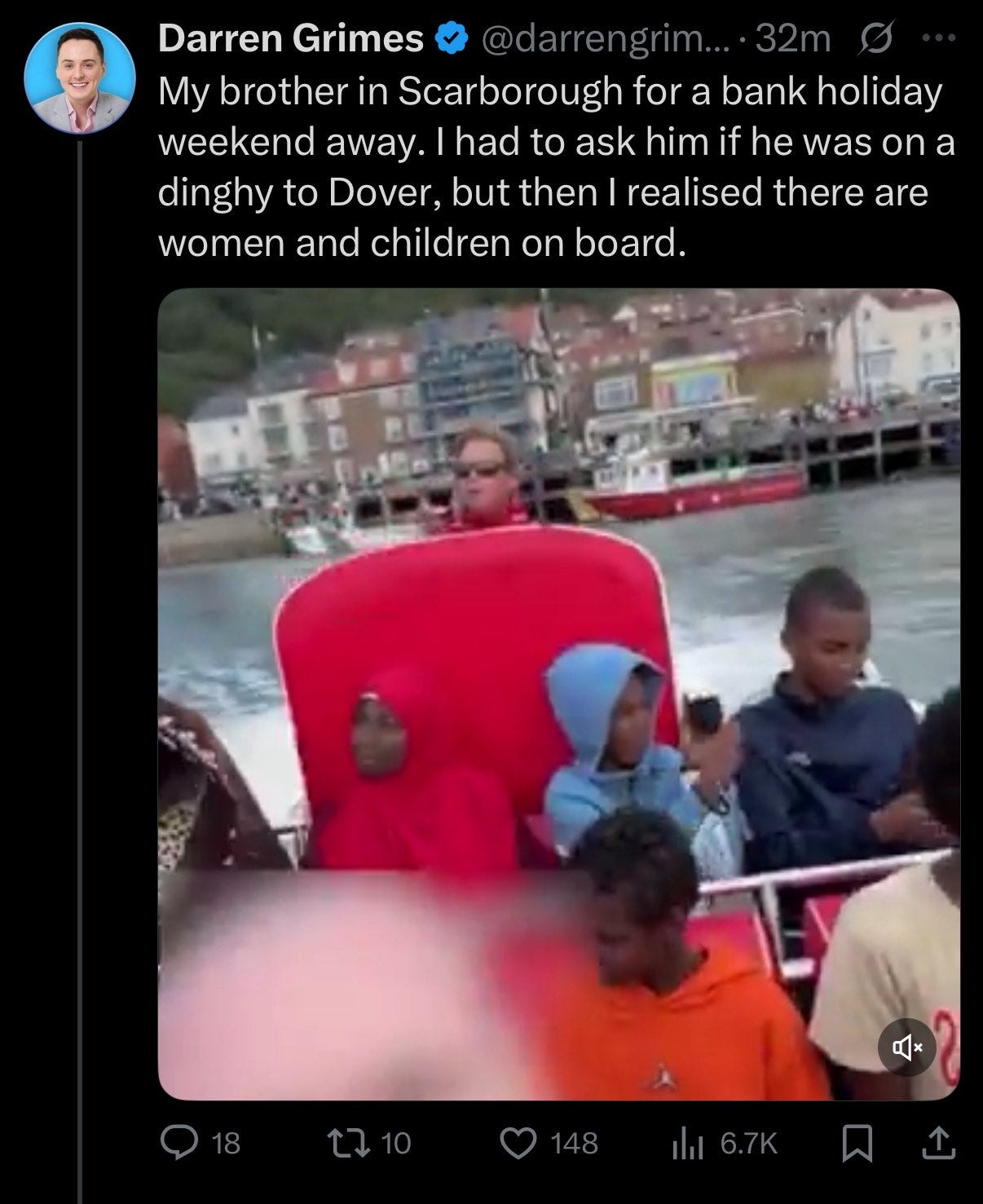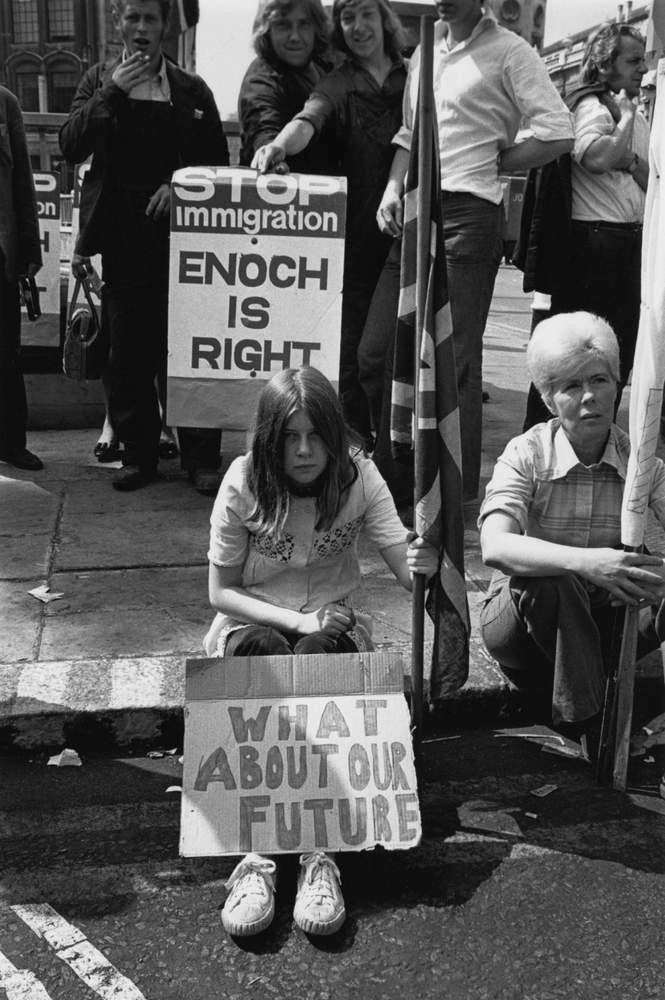Enoch's Return
How racism became respectable again
Last week a friend of ours was in Bedfordshire for a business meeting with a packaging company. The meeting was preceded by an unexpected encounter with the firm’s owner, a man of a certain age. Our friend is Iranian, daughter of refugees who escaped in the early days of the first Ayatollah. She possesses what the romantic novelists would call “dark good looks”.
From the very first handshake our man was on the attack. She lived in London? he asked. Well, he hadn’t been there for years and wouldn’t want to visit since “these days I would be a minority there”. She suggested he might find the capital surprisingly convivial. No, he replied, he would “probably get stabbed or have my phone stolen”.
From there he progressed to asking her where she came from, to which she replied “London”, an answer he refused to accept. When told the family was originally Persian, but she identified as British he said, “yes but do you identify as English?” Then, did her children identify as English (their father is a doctor from the Home Counties)? And when he discovered that she hadn’t asked them that question he moved on to asylum seekers, hotels, criminality and rapidly covered the full associative gamut.
When he finally departed his son (who actually ran the business but hadn’t said a word during his father’s unilateral conversation), apologised and wondered whether our friend would still want to use his company. She wondered too.
OK, so the dad was an asshole and there’s never been a shortage of those. But he was a particular kind of an asshole whose relaxed social sphincter disgorged a very particular set of attitudes at a very particular time. He made a potential customer feel like an unwelcome outsider purely because she didn’t look like his idea of English. He linked her origins to stabbings, crime, foreign spongers and anti-patriotism and all on first acquaintance.
A day or so later the deputy leader of Durham council posted on X an excerpt of a video taken by his brother in Scarborough harbour over the bank holiday weekend. Filming in a small boat the brother had faked a selfie in order to film some children sitting behind him and two young men next to him. He had then sent the clip to his sibling, who blanked out his brother’s face (but not the faces of the children) with the comment:
My brother in Scarborough for a bank holiday weekend away. I had to ask him if he was on a dinghy to Dover, but then I realised there are women and children on board.
The children were Black or mixed race and the young men were Turkish at a guess. The post was “liked” 4,000 times. The poster was ex GBNews presenter, publicity addict and Reform party member, Darren Grimes. It must be fun being non-White in Durham right now.
Slipping back sixty years
I was 13 when Enoch Powell made his Rivers of Blood speech. I recall the edition of BBC Radio’s Any Questions in the wake of that speech where the Daily Express columnist Jean Rook told the audience that she would “loathe to live next door to a black man” (I was a very political child). I remember the atmosphere in the wake of his speech with the (pre-Murdoch) News of the World editorialising that “most people in the country will agree with him… We can take no more coloured people. To do so, as Mr Powell says, is madness”. The urbane columnist Peregrine Worsthorne told Telegraph readers that there needed to be repatriation of coloured immigrants, albeit voluntary. The Smithfield porters and some London dockers marched in support of Powell waving placards with slogans such as “Back Britain, not Black Britain”. When Powell was disowned by his party leadership (more on that later) he apparently received tens of thousands of letters of support and polling showed over two thirds of those asked agreeing with Powell’s sentiments, with Gallup on 74% and NOP at 67%.
In his book The Long 68, Richard Vinen quotes the recollection of a Smithfield worker called “Big” Dan Harmston (who had been a member of Oswald Mosley’s post-war Union Movement) of the day after the Powell speech:
if that day I'd said [to his colleagues] “pick up your cleavers and knives and decapitate Heath and Wilson” they'd have done it. They really would, but they wouldn't have done it next week. It was just that mood of the moment- like the storming of the Bastille I suppose.
There were, of course, the usual sophisticated admirers who could discover no racism in Powell’s speech (did he not enjoy Indian food?) but merely a representation of what these days are labelled “legitimate concerns”. This despite the passage of the speech in which Powell told the story of an old lady who…
…is afraid to go out. Windows are broken. She finds excreta pushed through her letterbox. When she goes to the shops, she's followed by children, charming, wide grinning piccanninies. They cannot speak English, but one word they know. “Racialist” they chant. When the new race relations bill is passed, this woman is convinced she will go to prison. And is she so wrong? I begin to wonder.
Picatinny was a word used by Whites to describe Black children in the old South and in the British Empire. The Black child is wild, mischievous and ungovernable. He may look cute but he’s half feral. It’s a racist expression and was so back in the 60s.
And the Windrush generation of Black children were all Caribbean and they spoke English. Even if they hadn’t been able to, then the word “racialist” was an extremely unlikely single word for them to know. But a convenient one for the sake of arguing that ordinary Brits were being victimised for their ordinary opinions about migrants. The old lady was never identified.
In London in the 60s you could still see the graffiti of the period of the anti-Black Notting Hill riots of the late 50s: the lightning flash in the circle which had been the symbol of the British Union of Fascists and the letters KBW – Keep Britain White. At my first football matches in the late 70s monkey noises routinely greeted the very few Black players who graced the First Division. Playground jokes centred on how non-white immigrants were dirty, ate pet food, bred like rabbits and lived 20 to a room.




